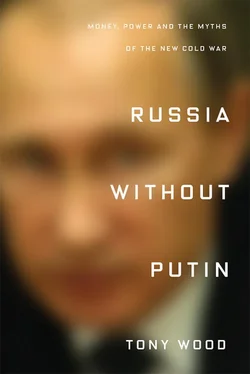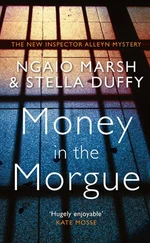The demonstrations of late 2011 and early 2012 drew the largest crowds since the mass marches of the glasnost era. The organizers of the Moscow miting on 4 February 2012 were clearly trying to encourage such comparisons: that had also been the date of an enormous march around the capital’s Garden Ring in 1990, to protest the Communist Party’s monopoly on political representation. The city authorities got the reference and refused permission for a march along the same route, insisting it be held instead in Bolotnaya Square, on an island in the Moscow River. The square thereafter became the venue for several subsequent protests, and supplied a catch-all term for the movement, too; though it was hardly an auspicious name: boloto is the Russian word for ‘swamp’.
These protests were greeted as a ‘revolt of the middle class’ – an expression of discontent from those who had done well out of the petro-boom of the 2000s and were now anxious at being squeezed by recession. But the idea of the ‘new middle class’ was a chimera, part ideological fantasy purveyed by the state and the media, part wishful projection by the population itself. And it didn’t tally with the sociological make-up of the participants in the 2012 demonstrations. As one protester revealingly put it when interviewed, ‘I belong to the middle class, but it doesn’t exist.’ {10} 10 Artemy Magun et al, ‘The Russian Protest Movement of 2011–2012: A New Middle-Class Populism’, Stasis , 1, 2014, pp. 160–91.
The bulk of the participants do seem to have been urban, educated and broadly liberal in their politics. A survey of a miting held on Moscow’s Sakharov Avenue on 24 December 2011 found that three-fifths of those present held a higher degree, and almost half gave their occupation as ‘specialist’. But this was by no means the prosperous bourgeoisie depicted in many Western accounts: 21 per cent said they could only afford essentials, and 40 per cent said they could not afford a car – which in effect disqualified them from the middle class, even according to one of the modest yardsticks widely used at the time. {11} 11 ‘Opros na prospekte Sakharova 24 dekabria’, Levada Centre, 26 December 2011.
The idea that these were ‘young professionals’ was also belied by their generational profile: a fifth of those at the 24 December gathering were over fifty-five; a quarter were between eighteen and twenty-four. While some of those attending might well have remembered the demonstrations of 1990, many had come of age under Putin and knew nothing but the present system: the Yeltsin era would have been a chaotic blur, and the USSR something akin to Atlantis. Outside Moscow, the protests were small but heterogeneous, and some occurred in places that still lacked any of the boom-time amenities that supposedly marked a rising middle class. {12} 12 Masha Gessen, ‘It’s not just the Russian middle class in revolt – this is a true mass movement’, Guardian , 3 March 2012.
Conversely, large swathes of those who really were members of the ‘middle class’ hailed by Western commentators failed to join the protests – perhaps because many of them would have been state-sector employees, the biudzhetniki who formed a central part of Putin’s support base.
The sociological diversity of the protesters was reflected, too, in their ideological heterogeneity. ‘Russia without Putin’ was the hopeful banner under which many thousands marched. But beyond this basic point in common, they had very different ideas about what that Russia would look like. The protests were a medley that included not only established liberal parties such as Yabloko and Boris Nemtsov’s Solidarity but also leftist groups such as the Russian Socialist Movement and the Left Front, as well as nationalist outfits such as the Movement Against Illegal Immigration (DPNI) and various groupuscules waving the tricolour of the Romanov dynasty. Alongside all these, there were also a number of social organizations: ecologists protesting the destruction of Khimki forest; the Blue Buckets, campaigning against abuses of authority by traffic police; the local franchise of the e-libertarian Pirate Party; and the avowedly ‘non-political’ League of Voters, which included many prominent intellectuals and cultural figures, such as the TV personality Leonid Parfyonov, ageing rock star Yuri Shevchuk and the writers Dmitrii Bykov, Liudmila Ulitskaia and Grigorii Chkhartishvili (better known as retro-whodunit writer Boris Akunin).
This bewildering political breadth was in part a product of the narrowness of the ‘imitation democratic’ system, which by design excluded most of the political spectrum. Yet within this diversity, the outlines of two camps emerged: a liberal one, focused on the demand ‘For Honest Elections’, and a smaller, leftist one, with a wider social agenda. Though the liberal camp predominated early on, its power quickly waned after it became clear there would be no re-run of the Duma vote, and that Putin would easily canter to victory in the presidential election, rigged or not. By the time protests against Putin’s foreordained inauguration took place in May 2012, it was mainly the leftist groups that were still in the streets – and they bore the brunt of the repression thereafter. It was also an array of leftist groups that inspired the ‘Occupy Abai’ protest that took over a small park in central Moscow in May, before being forcibly expelled by riot police after a couple of weeks. [10] The name derived from the statue to a nineteenth-century Kazakh poet, Abai Kunanbaev (or Qunanbaiuli in Kazakh), next to which the camp originally sprang up.
The differences between the liberal and left wings of the movement were apparent from early on. At the demonstration on 24 December 2011, liberal figurehead Ksenia Sobchak – a TV star and daughter of the former St Petersburg mayor who had been Putin’s boss in the 1990s – told the crowd that ‘the main thing is to exert influence on power, rather than to struggle for power’. She was whistled and booed by sections of the crowd, who no doubt thought precisely the opposite. When the left tried to formulate a list of social demands for the movement to put forward, the liberals rejected the idea as ‘divisive’. Ultimately, ‘For Honest Elections’ – the liberal slogan that became the name of the umbrella organization coordinating the protests – was a demand for the system to function better, rather than for a fundamentally new system.
This disjuncture between a clear but inadequate and easily blocked political goal on the one hand, and a more expansive but largely unarticulated social agenda on the other, was a critical flaw in the anti-Putin movement, and it limited its potential reach across Russian society. But the protesters also faced tremendous obstacles which even a better organized and more widely supported movement would have been hard pressed to surmount. After Putin’s return to the Kremlin, their room for manoeuvre shrank still further.
From 2012 onward, the opposition to Putin was pummelled by a combination of judicial persecution and ideological pressure. Once he had regained the presidency, Putin adopted an increasingly strident nationalistic rhetoric. A new official ideology, which placed ever greater emphasis on ‘civilizational’ differences between East and West, had begun to coalesce before Putin’s re-election as president, hovering in the background of Russia’s confrontations with the US and its allies. Now it moved to the fore – and burst onto the international stage with the annexation of Crimea. But though shaped by external pressures, it was also a strategy for dealing with dissent at home, driving a wedge through Putin’s opponents by framing everything in polarized, friend–enemy terms.
Читать дальше












